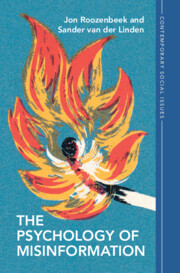Book contents
- The Psychology of Misinformation
- Contemporary Social Issues
- The Psychology of Misinformation
- Copyright page
- Contents
- Figures
- Acknowledgments
- Prologue
- Part I Setting the Stage
- Part II Misinformation Belief and Spread
- 4 Why Do People Believe and Share Misinformation?
- 5 Echo Chambers and Filter Bubbles
- Part III Countering Misinformation
- References
- Index
4 - Why Do People Believe and Share Misinformation?
from Part II - Misinformation Belief and Spread
Published online by Cambridge University Press: 28 March 2024
- The Psychology of Misinformation
- Contemporary Social Issues
- The Psychology of Misinformation
- Copyright page
- Contents
- Figures
- Acknowledgments
- Prologue
- Part I Setting the Stage
- Part II Misinformation Belief and Spread
- 4 Why Do People Believe and Share Misinformation?
- 5 Echo Chambers and Filter Bubbles
- Part III Countering Misinformation
- References
- Index
Summary
This chapter discusses the individual-level and societal-level factors that underlie why people believe and share misinformation, including analytical and open-minded thinking, political partisanship, trust, political and affective polarization, psychological appeal, repetition, emotion, and intergroup sentiment. We look at misinformation belief and sharing separately: just because someone believes a false claim to be true doesn’t mean they’ll share it on social media, and someone sharing a piece of misinformation doesn’t always mean they also believe it.
- Type
- Chapter
- Information
- The Psychology of Misinformation , pp. 57 - 71Publisher: Cambridge University PressPrint publication year: 2024

